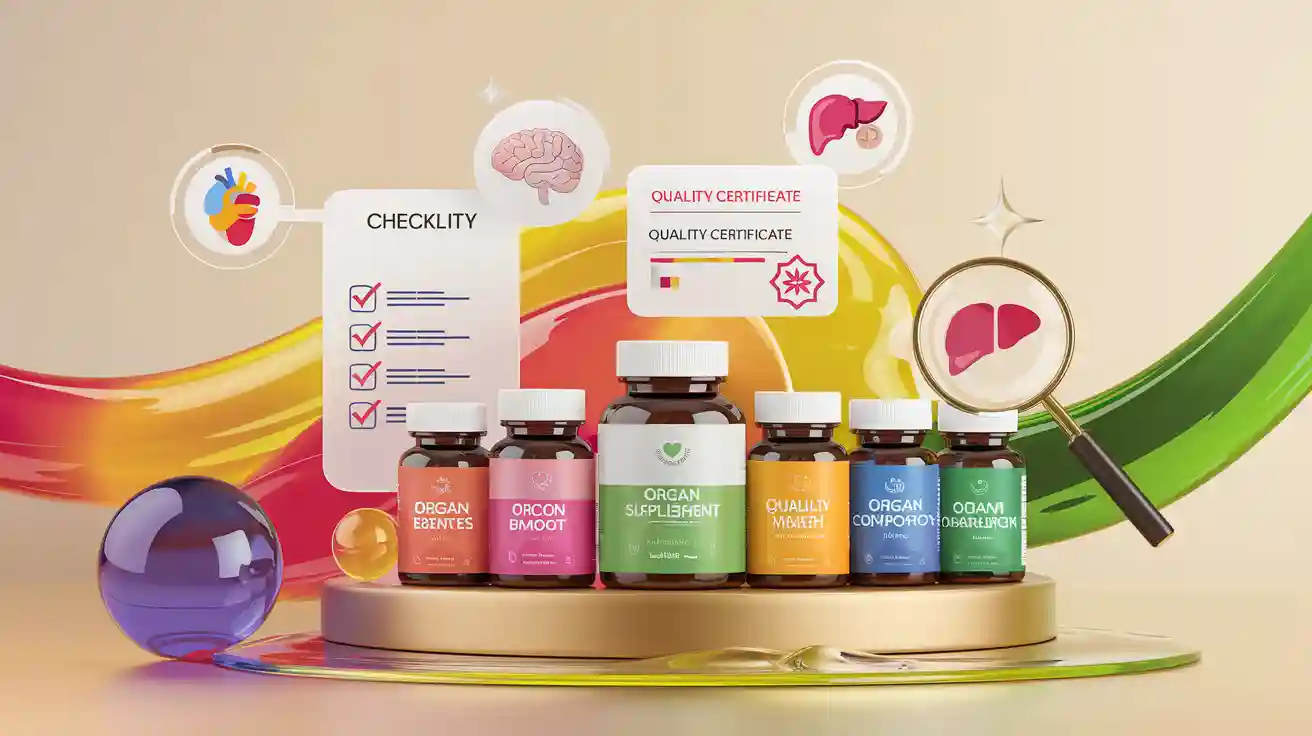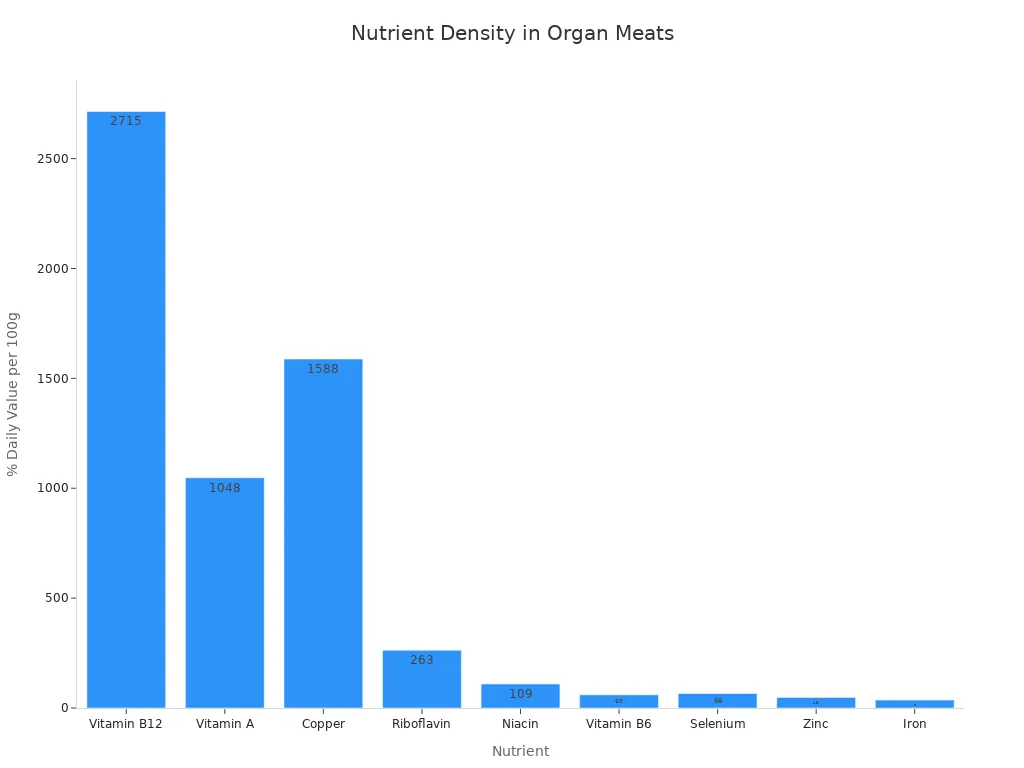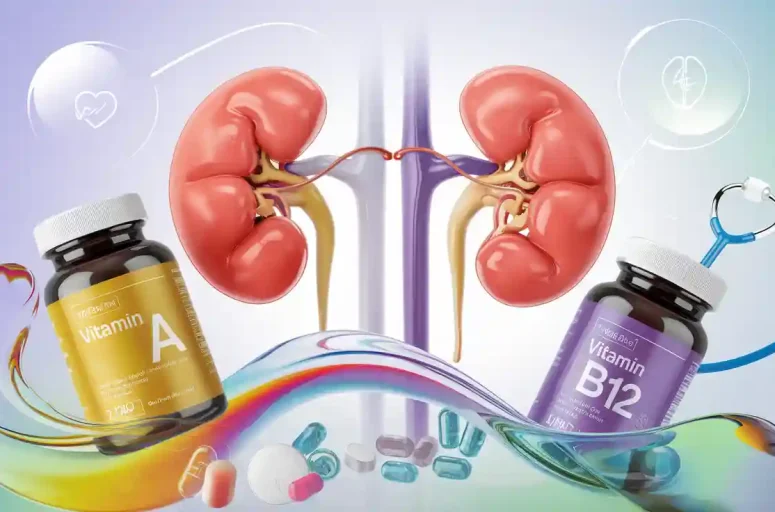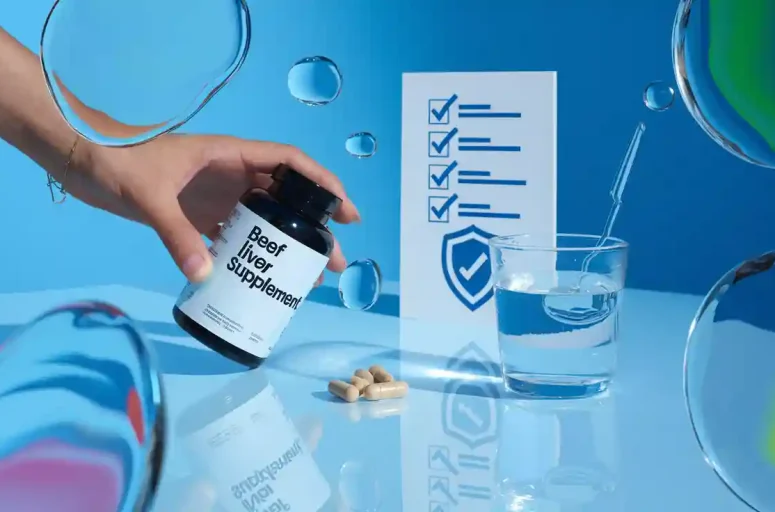
You may wonder if organ supplements are right for you. Most people do not need these products, but you might benefit if you have certain nutrient deficiencies or high physical demands. Organ meats like liver, heart, and kidney offer vitamins A, B, C, E, iron, zinc, and amino acids. Beef organ supplements try to capture these nutrients, though processing can reduce their strength. Many people use supplements for health, yet only a small number choose organ-based options. Research shows organ supplements benefits risks depend on your needs and health status. Organ meats have a long history in nose-to-tail eating, but not all claims about liver or organ health are proven. Some nutrients, such as vitamin A, may cause harm if taken in excess. Always choose organ supplements carefully.
Medical Disclaimer: This information is for educational purposes only. You should consult a healthcare professional before making health decisions or starting new supplements.
Key Takeaways
Organ supplements provide concentrated nutrients like vitamins A, B12, iron, and zinc that support energy, immune health, and bone strength.
These supplements may help people with nutrient deficiencies, athletes, or those with limited diets but are not needed by most healthy individuals.
Too much vitamin A from liver-based supplements can cause serious health problems, so always follow dosage instructions carefully.
Choose organ supplements made from grass-fed animals with third-party testing to ensure safety and avoid contamination.
Start with a low dose and take supplements with meals to improve absorption and reduce side effects.
Organ supplements do not replace whole organ meats, which offer more nutrients and taste, but they can fill nutritional gaps.
Consult a healthcare professional before starting organ supplements, especially if you are pregnant, have health conditions, or take medications.
Watch for red flags like vague labels, unsupported claims, or lack of quality certifications when selecting organ supplements.
Organ Supplements Benefits Risks
Key Benefits
Nutrient Density
You get a concentrated source of nutrients when you choose beef organ supplements. Organ meats like liver, heart, and kidney are nutrient-dense powerhouses. They contain high levels of vitamin A, B vitamins, iron, zinc, and protein. These nutrients support your body’s energy production, immune function, and overall health. Organ supplements benefits risks depend on your needs, but the nutrient density stands out as a major advantage. Many people find that beef organ supplements offer enhanced nutrient absorption compared to synthetic vitamins because the nutrients come in a natural, whole-food matrix. This means your body can use them more efficiently.
Energy and Mood
You may notice improved energy and mood when you correct nutrient deficiencies with organ supplements. Vitamins such as B12, iron, and magnesium play key roles in reducing fatigue and supporting cognitive function. Clinical studies show that people with low levels of these nutrients often feel tired or mentally foggy. When you restore these nutrients, you may experience better focus and less tiredness. Beef organ supplements can help athletes or those with high physical demands meet their nutritional needs, especially if their diet lacks variety. Organ meats provide nutrients that support cellular energy and brain health, making them a popular choice for those seeking natural health benefits.
Bone and Hair Health
You support your bones and hair by including organ meats in your routine. Liver and kidney are rich in vitamin A, vitamin K, and minerals like zinc and iron. These nutrients help maintain strong bones and healthy hair growth. Some people use beef organ supplements to address brittle nails or thinning hair. The nutritional benefits of organ meats come from their unique mix of vitamins and minerals, which you may not get from muscle meat alone. Organ supplements benefits risks include the potential for improved bone and hair health, but you should always monitor your intake to avoid excess.
Immune Support
You can boost your immune system with organ supplements. Organ meats contain vitamin C, zinc, and other immune-supporting nutrients. These nutrients help your body fight off infections and recover from illness. Beef organ supplements may offer an easy way to get these nutrients if you do not eat organ meats regularly. Some studies suggest that organ meats support immune health better than many plant-based foods because of their high nutrient density. However, you should remember that organ supplements benefits risks also include the chance of getting too much of certain nutrients, so balance is key.
Main Risks
Vitamin A Toxicity
You risk vitamin A toxicity if you take too many beef organ supplements, especially those made from liver. Liver contains very high levels of vitamin A. Too much vitamin A can cause headaches, bone pain, liver damage, and even birth defects. The NIH warns that chronic intake above safe levels can harm your health. Always check the label and avoid taking multiple supplements with vitamin A.
High Cholesterol
You may increase your cholesterol levels if you consume large amounts of organ meats or beef organ supplements. Organ meats are high in cholesterol and saturated fat. While moderate intake may not affect everyone, people with heart disease or high cholesterol should be cautious. Organ supplements benefits risks include the possibility of raising cholesterol, so talk to your doctor if you have concerns.
Contamination
You face the risk of contamination when you use organ supplements. Organs filter toxins from the body, so they can accumulate heavy metals like cadmium and lead. Some supplements may also contain hormone residues or other contaminants. Studies show that offal from polluted environments can have elevated levels of toxic metals. Always choose products from trusted sources to reduce the risk of toxin accumulation.
Regulation Issues
You should know that organ supplements are not strictly regulated. Many products lack consistent potency and purity. Some may contain unlisted hormones or other substances that could harm your health. The U.S. Pharmacopeia notes that many supplements do not meet quality standards unless they have third-party testing. Organ supplements benefits risks include the uncertainty of what you are actually consuming.
Note: No long-term studies have confirmed the safety of multi-organ supplements. You should use caution and consult a healthcare professional before starting any new supplement.
Who Should Use or Avoid
You may benefit from beef organ supplements if you have a diagnosed nutrient deficiency, high physical demands, or trouble eating a varied diet. Athletes, people with iron-deficiency anemia, or those with low B12 may see improvements in energy, mood, and overall health. Organ meats and supplements can help fill nutritional gaps, especially for those who do not eat animal products often.
However, you should avoid organ supplements if you are pregnant, have liver disease, or are at risk for vitamin A toxicity. Children and older adults should use caution, as they are more sensitive to high doses. People with high cholesterol or heart disease should limit their intake of organ meats and beef organ supplements. If you take medications or have chronic health conditions, always talk to your doctor first.
Who May Benefit | Who Should Avoid |
|---|---|
Athletes | Pregnant women |
People with iron deficiency | People with liver disease |
Those with B12 deficiency | Children and older adults |
Individuals with high demands | Those at risk for vitamin A toxicity |
People with poor diet variety | People with high cholesterol |
You should always weigh the organ supplements benefits risks before adding them to your routine. Whole organ meats may offer more nutritional benefits, but supplements can help if you cannot eat these foods. Remember, balance and quality matter most for your health.
Beef Organ Supplements

Beef organ supplements give you a concentrated source of nutrients from different organs. You get a mix of liver, heart, kidneys, and sometimes bone marrow or pancreas. These supplements aim to capture the nutritional profile of beef organ meats, offering benefits for your health, brain, and energy.
Nutrient Profile
Vitamins and Minerals
You receive a wide range of vitamins and minerals from beef organ supplements. The nutrient content depends on the organ blend and product quality. Liver stands out as the most nutrient-dense organ, packed with vitamin A, B12, iron, copper, and zinc. Heart provides coenzyme Q10, B vitamins, and selenium. Kidneys supply B vitamins, selenium, and omega-3 fatty acids. Bone marrow adds calcium and vitamin K1. The table below shows the key nutrients found in each organ:
Organ | Key Nutrients (Excellent Source) | Additional Notes |
|---|---|---|
Liver | Protein, Vitamin A, Riboflavin, Pantothenic acid, Vitamin B6, Niacin, Vitamin B12, Copper, Iron, Phosphorus, Zinc | Good source of Manganese |
Heart | Protein, Riboflavin, Niacin, Vitamin B12, Iron | Good source of Pantothenic acid, Vitamin B6, Copper, Zinc |
Kidneys | Protein, Riboflavin, Pantothenic acid, Vitamin B6, Vitamin B12, Copper, Iron, Phosphorus | Good source of Zinc |
Tongue | Protein, Riboflavin, Niacin, Vitamin B12, Zinc | Good source of Vitamin B6, Iron, Phosphorus |
Bone Marrow | Calcium, Phosphorus | Good source of Vitamin K1 |
You also get vitamins A, D, E, K2, and B-complex, along with minerals like copper, selenium, heme iron, and zinc. The nutritional profile varies by organ mix and processing method. Freeze-dried beef organ supplements from grass-fed beef preserve most nutrients and offer high bioavailability.
Unique Compounds
Beef organ supplements contain unique compounds not found in muscle meat. You get digestive enzymes such as lipase, protease, and amylase from pancreas. Peptides like tuftsin and splenopentin from spleen support immune health. Liver provides high levels of retinol, folate, and choline. Heart supplies coenzyme Q10, which helps your brain and cellular energy. Kidneys add omega-3 fatty acids and selenium. These compounds work together to support your health, brain function, and metabolism.
Digestive enzymes help break down food and improve nutrient absorption.
Immune-supporting peptides boost your body’s defenses.
Collagen and gelatin from connective tissue aid gut health.
Coenzyme Q10 from heart supports energy production in your brain and muscles.
Health Impact
Energy Levels
You may notice better energy when you use beef organ supplements. Liver and heart provide B vitamins, iron, and coenzyme Q10, which help your body produce energy. These nutrients support your brain and muscle function. Essential amino acids from organ meat supplements help reduce fatigue and muscle soreness. You get a boost in energy metabolism, making these supplements popular among athletes and people with high physical demands.
Exercise Performance
Beef organ supplements can improve your exercise performance. Studies show that liver and other organ blends provide branched-chain amino acids (BCAAs) like leucine, isoleucine, and valine. These support muscle growth, repair, and recovery. You may experience less post-exercise fatigue and faster recovery. Supplements help maintain muscle glycogen, which fuels your workouts. The antioxidants and peptides in organ meat supplements protect your brain and muscles from stress.
Usage Considerations
You should start beef organ supplements with a low dose, such as 1-2 capsules daily. Increase the dosage gradually to the recommended amount. Take the supplements with meals containing fat to improve absorption. Morning use often works best for energy and brain support. Choose products made from grass-fed beef, processed by freeze-drying, and free from fillers. Consistent, long-term use gives you the best health results. Always consult a healthcare professional before starting organ meat supplements, especially if you have health conditions.
Medical Disclaimer: This information is for educational purposes only. You should consult a healthcare professional before making health decisions or starting new supplements.
Organ Meats in the Diet
Comparison to Muscle Meat
You may wonder how organ meats stack up against muscle meats in your diet. Organ meats deliver much higher levels of vitamins and minerals than muscle meats. You get 10 to 100 times more nutrients from organ meats, making them some of the most nutrient-dense meats available. Nose-to-tail eating means you use every part of the animal, including organs, which gives you a broader range of nutrients.
Organ meats provide:
Essential trace minerals like copper and selenium for immune and metabolic health.
Unique nutrients such as biotin, CoQ10, and choline that support your energy, brain, and muscles.
Rich sources of B vitamins, including riboflavin, folate, and vitamin B12, which help your body produce energy and form red blood cells.
Peptides and amino acids like anserine, carnosine, taurine, and L-carnitine that support your heart, immune system, and nerves.
High levels of fat-soluble vitamins A, D, E, and K2, which help your vision, bones, and heart.
Highly bioavailable heme iron, which your body absorbs better than iron from muscle meats or plants.
The table below shows how organ meats compare to muscle meats for key nutrients:
Nutrient | Organ Meats (e.g., Beef Liver) | Comparison to Muscle Meat |
|---|---|---|
Vitamin B12 | Much higher | |
Vitamin A | Very high (1048% DV) | Much higher |
Copper | Very high (1588% DV) | Much higher |
Riboflavin | High (263% DV) | Much higher |
Niacin | High (109% DV) | Much higher |
Vitamin B6 | Moderate (60% DV) | Higher |
Selenium | Moderate (66% DV) | Higher |
Zinc | Moderate (48% DV) | Higher |
Iron | Moderate (36% DV) | Higher (heme iron) |

You see that organ meats are nutritionally denser ounce for ounce than muscle meats. Bison kidney and heart also offer more vitamins and minerals than typical muscle cuts. When you practice nose-to-tail eating, you get the benefits of nutrient-dense meats and a wider variety of nutrients.
Cultural Perceptions
Your attitude toward organ meats may depend on where you live and how you grew up. In the United States, people once avoided organ meats because they linked them to poverty and did not know how to prepare them. During World War II, this stigma was strong, but today, nose-to-tail eating is gaining popularity. Movements like paleo and keto encourage cooking with organ meats and help people appreciate their flavor and nutrition.
Around the world, organ meats play different roles in diets. In Turkey, you find organ meats in many traditional dishes. In Hong Kong, Mongolia, and Saint Lucia, people eat more edible offal than before. In China, pork offal is popular, while Japanese consumers enjoy a variety of organ cuts. Some people eat organ meats for their taste, nutrition, price, or sustainability. Others avoid them because of taste, appearance, or lack of childhood exposure. Food neophobia, or fear of new foods, can also be a barrier. Nose-to-tail eating helps reduce waste and supports sustainable food choices, which is one of the benefits of nose-to-tail eating.
Dietary Recommendations
You should include organ meats in your diet with care. Major health organizations in Europe, such as Portugal and Romania, recommend limiting organ meat intake. They suggest you eat organ meats sparingly and focus on lean meats, fish, and plant proteins. You get the most benefit from nose-to-tail eating when you balance organ meats with other foods.
Tips for adding organ meats to your diet:
Try small amounts of organ meats once or twice a week.
Choose fresh, high-quality organs from trusted sources.
Use simple recipes for cooking with organ meats, such as sautéed liver or grilled heart.
Mix organ meats with muscle meats to improve flavor and texture.
Practice nose-to-tail eating to get a variety of nutrients and reduce food waste.
Medical Disclaimer: This information is for educational purposes only. You should consult a healthcare professional before making health decisions or starting new supplements.
Choosing Quality Supplements

Sourcing and Processing
When you select an organ supplement, start by looking at the source of the ingredients. Clean sourcing is key for both safety and nutrient content. Choose products made from 100% grass-fed and finished cattle. This practice increases the levels of vitamins A, E, K2, omega-3 fatty acids, and CLA. You should look for supplements that come from single-source origins in countries with strict farming laws, such as New Zealand, Australia, or the United States. These regions have higher standards for animal welfare and traceability.
Organic or Non-GMO certifications help you avoid antibiotics, synthetic hormones, and genetically modified feed. These factors can affect both the safety and the nutrient purity of the organ supplement. Freeze-drying is the best processing method because it preserves heat-sensitive vitamins, enzymes, and cofactors. This keeps the nutrients bioavailable for your body. Always avoid products with fillers or additives. These can dilute the potency and may cause digestive issues or allergic reactions. Third-party lab testing with Certificates of Analysis (COAs) confirms the absence of contaminants like heavy metals and pathogens. Brands that share details about their sourcing, farming, and processing show integrity and help you trust their quality.
Label Transparency
You need to read supplement labels carefully to make informed choices. The FDA requires that labels are truthful and not misleading. The Federal Trade Commission also monitors advertising claims to protect you from false statements. Labels should clearly state the name of the supplement, the net quantity, and provide nutrition facts such as serving size and percent daily values. Ingredient lists must include every component in the product. Any health claims must be accurate and not exaggerated. Warning statements are important if there are risks or contraindications.
Description / Purpose | |
|---|---|
Name of Dietary Supplement | Identifies the product clearly to consumers. |
Net Quantity of Contents | States the amount of product in the container (weight, volume, count). |
Nutrition Labeling | Includes serving sizes, percent daily values, and nutrition facts relevant to the supplement. |
Ingredient Labeling | Lists all ingredients contained in the supplement to ensure transparency. |
Claims | Any statements about the product’s benefits must be truthful and not misleading. |
Warning Statements | Required if applicable, to inform consumers of potential risks or contraindications. |
Other Labeling Information | May include pre-market notifications, special instructions, or regulatory compliance statements. |
Accurate labeling is vital because thousands of adverse effects, including organ damage, occur each year due to dietary supplements. Look for products that follow Good Manufacturing Practices (GMP) and have third-party testing. These steps help ensure that what you see on the label matches what is in the bottle.
Certifications and Testing
Certifications and third-party testing give you confidence in the quality of your organ supplement. Reliable certifications include NSF, USP, Non-GMO Project Verified, Certified Vegan, and Certified Gluten-Free. These labels confirm that the supplement meets standards for identity, strength, and purity. Supplements made under current Good Manufacturing Practices (cGMP) follow strict safety and sanitation rules. Third-party organizations inspect manufacturing sites, raw materials, and finished products to verify compliance.
Some certifications focus on specific needs. For example, IFOS checks the purity and label accuracy of fish oil supplements. Non-GMO Project Verified ensures the product does not contain genetically modified organisms. Certified Vegan and Certified Gluten-Free labels help you find supplements that fit your dietary preferences. While certifications do not guarantee that a supplement will work for everyone, they do show a commitment to quality and safety.
Medical Disclaimer: This guide is for informational purposes only. You should consult a healthcare professional before making health decisions or starting new supplements.
Dosage and Safety
You need to pay close attention to dosage when using organ supplements. Each product can have different concentrations of nutrients, especially vitamin A from liver. Taking too much can lead to health problems, including headaches, dizziness, or even more serious issues like liver damage. Always start with the lowest recommended dose on the label. Increase only if you do not notice any side effects and your healthcare provider agrees.
You should check the serving size and the amount of each nutrient per dose. Some organ supplements contain a blend of liver, heart, and kidney, which can make it hard to know exactly how much of each nutrient you get. This lack of standardization can cause you to get too much or too little of certain vitamins and minerals. For example, vitamin A toxicity is a real risk if you take high doses of liver-based supplements for a long time.
Safety concerns also include possible interactions with medications or other supplements. If you take blood thinners, high doses of vitamin K from organ supplements may affect your medication. Children, pregnant women, and people with chronic illnesses should be extra careful. You should always talk to your doctor before starting any new supplement, especially if you have health conditions or take prescription drugs.
To stay safe, follow these tips:
Read the label for serving size and nutrient amounts.
Avoid taking multiple supplements with the same nutrients.
Do not exceed the recommended daily intake for vitamins and minerals.
Monitor your body for any unusual symptoms.
Red Flags
When choosing an organ supplement, you should watch for warning signs that may signal poor quality or potential harm. Look out for these red flags:
Claims that sound too good to be true, such as “supports immunity” or “boosts energy,” without clear scientific evidence.
Vague ingredient lists or missing information about which organ parts are used.
Inconsistent labeling or different claims for the same ingredients.
No mention of third-party testing or quality certifications like NSF Certified or USP Verified.
Products that do not list the country of origin or the source of the animals.
Supplements that promise results based only on historical use, not on human clinical trials.
Lack of standardization in nutrient content, which can lead to over- or under-supplementation.
Reports of contamination with heavy metals or environmental toxins, especially in liver supplements.
The FDA does not strictly regulate supplements, so some may contain hidden or harmful ingredients.
Medical Disclaimer: This information is for educational purposes only. It does not replace medical advice. You should consult a healthcare professional before making health decisions or starting new supplements.
Getting Started Safely
Introducing Supplements
You can introduce organ supplements into your routine by following a few simple steps. Start with the recommended daily dose, which is usually 4 to 6 capsules of beef liver and spleen taken with water. You may take all capsules at once, or spread them throughout the day. Both methods work well. If you prefer, open the capsules and add the powder to smoothies or meals. This makes it easier to consume, especially for children or those who dislike swallowing pills.
For babies and children over six months, use about one-quarter of the adult dose a few times per week. Always check the label for instructions and follow them closely. Choose supplements sourced from healthy, grass-fed animals to reduce the risk of toxins. Freeze-dried supplements preserve more nutrients than desiccated ones. Remember to use organ supplements as part of a balanced diet, not as a replacement for whole foods.
Tip: Consistency matters. Take your supplements regularly to see the best results.
Combining with Diet
You can combine organ supplements with a balanced diet to improve your nutrition. These supplements provide bioavailable vitamins and minerals such as vitamin A, B12, iron, folate, CoQ10, and selenium. They support your energy, immune system, and hormonal health. Organ supplements work best when you take them consistently, such as 4–6 capsules daily.
Organ supplements are a convenient way to fill nutritional gaps, especially if you do not eat organ meats often. Choose products made from grass-fed sources without synthetic additives. This aligns with clean eating principles. Combining supplements with a balanced diet honors ancestral nutrition and boosts your overall nutrient intake. Experts recommend getting most nutrients from whole foods, because your body absorbs them better. Use supplements as an adjunct when your diet is restricted or your lifestyle makes it hard to get enough nutrients.
Nutrient synergy happens when different nutrients work together for greater benefits. For example, B vitamins and CoQ10 in organ supplements can enhance absorption and support your immune system, brain, and energy metabolism. Advances in nutrition science show that combining supplements with a healthy diet can optimize your health.
Consulting Professionals
You should talk to a healthcare professional before starting organ supplements, especially if you have chronic health conditions. Doctors and registered dietitians can assess your diet and help you decide if supplements are right for you. They may recommend targeted vitamins or minerals instead of organ complexes. Healthcare professionals warn that the supplement market is not strictly regulated. Some products may contain contaminants or lack proven safety.
If you are pregnant, breastfeeding, or giving supplements to children, professional guidance is essential. Subtle vitamin deficiencies can contribute to chronic diseases, so expert advice helps you avoid risks. Most experts suggest getting nutrients from whole foods, which are safer and better researched. Use supplements only if your doctor recommends them, and follow their instructions for dosage and duration.
Medical Disclaimer: This information is for educational purposes only. It does not replace medical advice. You should consult a healthcare professional before making health decisions or starting new supplements.
You have learned that organ supplements provide concentrated nutrients, but research shows no proven benefits for most people. Risks include possible contamination, vitamin A or iron overload, and lack of quality control. Experts recommend:
Getting nutrients from whole foods first
Choosing third-party tested supplements if needed
Consulting a healthcare professional before starting any new supplement
Medical Disclaimer: This information is for educational purposes only. Always talk to your healthcare provider before making health decisions or starting supplements.
FAQ
What are organ supplements made from?
You get organ supplements from freeze-dried animal organs like liver, heart, kidney, and spleen. Most products use beef organs. Manufacturers process and encapsulate the powder for easy use.
Can you take organ supplements every day?
You can take organ supplements daily if you follow the recommended dose. Always check the label for serving size. Speak with your doctor before starting a new supplement.
Do organ supplements replace eating organ meats?
Organ supplements do not fully replace whole organ meats. You miss out on taste, texture, and some nutrients. Supplements help fill gaps if you cannot eat organ meats often.
Are organ supplements safe for children?
Children should use organ supplements only under medical supervision. Their bodies react differently to high doses of vitamins and minerals. Always ask your pediatrician before giving supplements.
How do you choose a high-quality organ supplement?
Look for products from grass-fed animals. Check for third-party testing and clear ingredient labels. Avoid supplements with fillers or artificial additives. Trusted brands share sourcing and testing details.
Can organ supplements cause side effects?
You may experience side effects like nausea, headaches, or vitamin toxicity if you take too much. Monitor your body for changes. Stop use and contact your doctor if you notice problems.
Do organ supplements interact with medications?
Some organ supplements may interact with medications, especially blood thinners. You should talk to your healthcare provider before combining supplements with prescription drugs.
Are organ supplements suitable for vegetarians or vegans?
Organ supplements come from animal sources. They do not fit vegetarian or vegan diets. You can choose plant-based supplements for similar nutrients.
Medical Disclaimer: This information is for educational purposes only. It does not constitute medical advice. You should consult a healthcare professional before making health decisions or starting new supplements.


